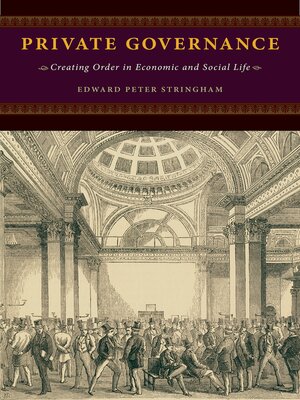
Sign up to save your library
With an OverDrive account, you can save your favorite libraries for at-a-glance information about availability. Find out more about OverDrive accounts.
Find this title in Libby, the library reading app by OverDrive.



Search for a digital library with this title
Title found at these libraries:
| Library Name | Distance |
|---|---|
| Loading... |
From the first stock markets of Amsterdam,London, and New York to the billions of electronic commerce transactions today, privately produced and enforced economic regulations are more common, more effective, and more promising than commonly considered. In Private Governance, prominent economist Edward Stringham presents case studies of the various forms of private enforcement, self-governance, or self-regulation among private groups or individuals that fill a void that government enforcement cannot. Through analytical narratives the book provides a close examination of the world's first stock markets, key elements of which were unenforceable by law; the community of Celebration, Florida, and other private communities that show how public goods can be bundled with land and provided more effectively; and the millions of credit-card transactions that occur daily and are regulated by private governance. Private Governance ultimately argues that while potential problems of private governance, such as fraud, are pervasive, so are the solutions it presents, and that much of what is orderly in the economy can be attributed to private groups and individuals. With meticulous research, Stringham demonstrates that private governance is a far more common source of order than most people realize, and that private parties have incentives to devise different mechanisms for eliminating unwanted behavior. Private Governance documents numerous examples of private order throughout history to illustrate how private governance is more resilient to internal and external pressure than is commonly believed. Stringham discusses why private governance has economic and social advantages over relying on government regulations and laws, and explores the different mechanisms that enable private governance, including sorting, reputation, assurance, and other bonding mechanisms. Challenging and rigorously-written, Private Governance will make a compelling read for those with an interest in economics, political philosophy, and the history of current Wall Street regulations.







